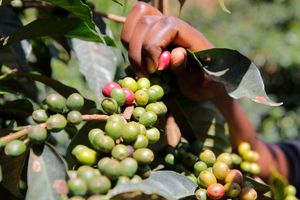
Deputy President Kithure Kindiki.
Deputy President Kithure Kindiki has taken over the role of spearheading reforms in the coffee sector, one of the key causes championed by his impeached predecessor Rigathi Gachagua.
On Thursday, has assured coffee farmers that earnings from their produce will increase this year owing to key interventions by the government that have improved production and increased returns.
Prof Kindiki said a kilo of cherry will fetch Sh110 this year, an improvement from what farmers received when the Kenya Kwanza administration took over in 2022.
Revamping of the coffee sector was a key campaign promise by President William Ruto and his then running mate Mr Gachagua, and soon after taking power the President tasked Mr Gachagua to oversee reforms in coffee, tea and milk sub-sectors.
In 2023 the former DP convened a high-level three-day stakeholder’s conference on coffee reforms in Meru County to discuss obstacles hindering the progress of the sub-sector and to come up with practical solutions.
Yesterday, Prof Kindiki hosted members of the National Assembly Coffee Caucus at his official residence in Karen for consultations on consolidating the reforms and sharing ideas on what needs to be done to improve earnings.
Prof Kindiki said the increased price has been occasioned by wide-ranging reforms and interventions instituted by the government, which have helped to streamline the sub-sector and eliminate perennial bottlenecks frustrating farmers.
“We have to make sure coffee farmers earn more, and coffee brings more foreign exchange as it used to. The Kenya Kwanza manifesto requires us to increase incomes and value for our farmers and other players in the value chain. We are faithfully implementing the manifesto to ensure the Guaranteed Minimum Returns of Sh100 per kg of cherry,” he said.
He called on MPs to fast-track the Coffee Bill, 2023 and Cooperatives Bill, 2024 that are before the Senate after the National Assembly approved them, saying they are central to the success of the efforts to further better earnings in the coffee value chain.
“The Bills must be finalised as soon as possible because they are at the centre of the reforms. We encourage the Senate to process the laws and unlock the coffee reforms package,” he said.
The DP also explained that the government, through various agencies, and in collaboration with the county governments, will ensure availability and access to quality seedlings and appropriate fertilisers.
“Last-mile distribution of subsidised fertiliser for coffee farmers is critical because we have seen the impact the farm input has had in other sectors like sugar cane and maize where production has shot up tremendously,” he said.
Waiving debt accrued by cooperatives, modernising factories, minimising losses along the production chain and promotion of Kenyan coffee in new global markets is also on top of the government’s agenda, the DP said.
The government is also looking to stimulate farming of the crop in new areas in the Rift Valley, Western, Nyanza and Lower Eastern. Additionally, the quest to improve production per bush is on course through quality seedlings, provision of better farm inputs including pesticides and extension services.
“We can have more production if we increase the acreage and the production per bush. We want to put more land under coffee and raise production from two kilos per bush to 10 kilos by 2027 as promised in our manifesto,” he added.
The Coffee Caucus comprises 78 MPs representing coffee-growing constituencies. Caucus chairman and Nyeri Town MP Duncan Mathenge said they are ready to push for legislative interventions that would make the coffee sub-sector more profitable for farmers. He also said reforms must remain on course so that gains already achieved are not lost.
“We have the expertise and are ready to execute any reforms or interventions that need to be done. We must ensure conflict of interest is dealt with. We cannot have a miller being a broker and a buyer at the same time,” he said.
Gichugu MP Gichimu Githinji said modernisation of equipment in coffee factories will lead to more earnings and maintenance of quality.
“Some of the factories still use equipment acquired in the 1960s. We need urgent modernisation for better production,” he said.
Tigania West MP John Mutunga, who is also the chairperson of the Agriculture committee, said research is critical in advancement of the sub-sector, noting that the pending Bills provide for revamping of research institutes.










